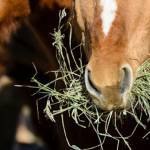Blister Beetles and Horses

Little beetles in alfalfa hay can often cause big problems for even the healthiest of horses.
Blister beetles are tiny but deadly pests that feed on alfalfa plants and other agricultural crops. Their bodies range from 0.5 to 1.25 inches (1.2 to 3 cm) and are usually narrow and cylindrical. Because different species have been identified, beetles may be striped, spotted, or black; the striped beetles are the most deadly and are more likely to move in swarms than the other two varieties.
Blister beetle eggs are laid in the soil, and young beetles remain underground until summertime, usually during, the peak agricultural growing season. Adult blister beetles are most attracted to blooming plants, especially alfalfa, and they tend to be concentrated near the edges of a field.
While blister beetles do feed upon alfalfa and other blooming crops, the biomass they ingest is minimal. The issue lies in the fact that they produce a toxin called cantharidin, which can kill horses that ingest it.
Cantharidin causes painful blistering of the skin when touched and ulceration and inflammation of the digestive tract when consumed. Horses that consume blister beetles usually colic. Frequent, painful urination is another sign of toxicity. Secondary infections and bleeding are also common in serious cases of cantharidin poisoning. As soon as the earliest signs of poisoning are detected, it is important to call a veterinarian and remove all suspect hay from the horse’s reach.
It is difficult to check hay for blister beetle contamination because crushed beetles release cantharidin oil, which remains on plant material even if the beetles are removed. In addition, cantharidin does not degrade with time, so even stored hay can be toxic.
Because blister beetles are most active in summer, the first cuttings of alfalfa hay or those made after the first hard frost are the safest. The best way to avoid trouble during the peak beetle season is to buy nonconditioned hay harvested before the bloom stage.
Blister beetles pose a significant threat to horses, but vigilant hay-shopping can avoid some of the problems associated with them.








